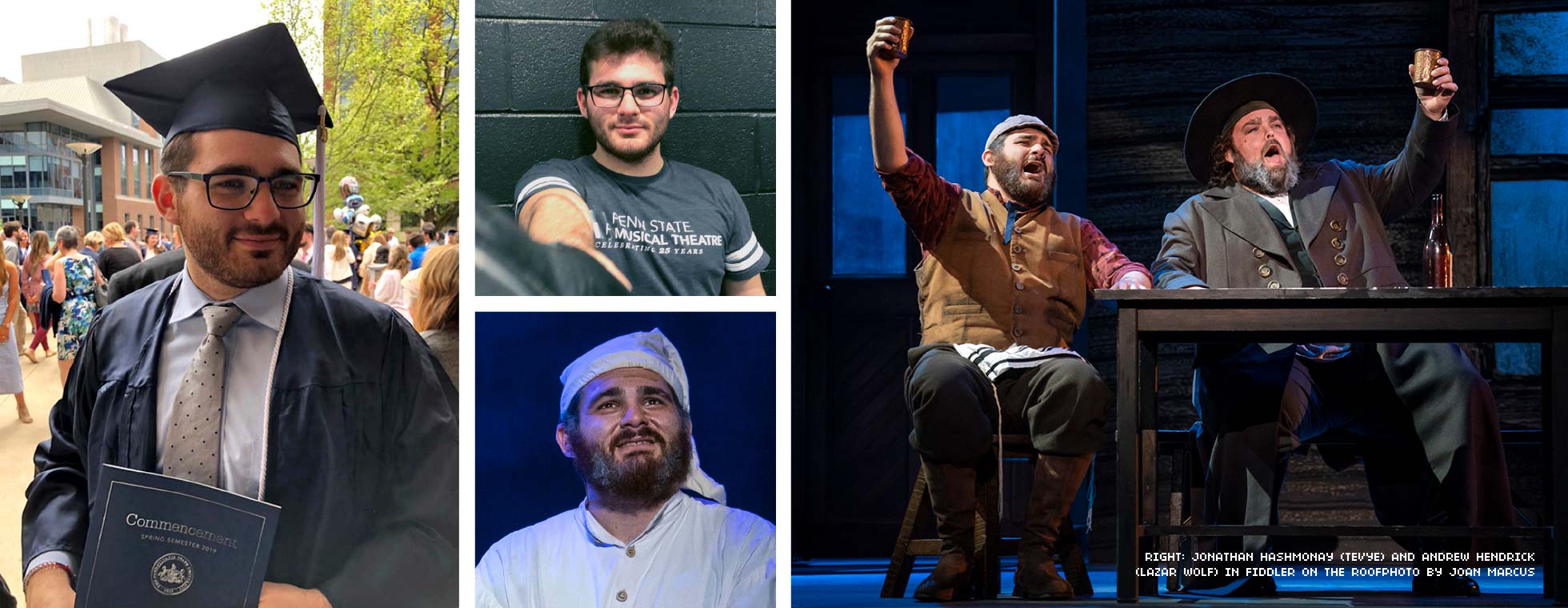Jonathan Hashmonay returns to Penn State as stage star

Living in Israel, Jonathan Hashmonay gave thought to his future post-mandatory military service. He considered the medical field — a commendable, traditional career path. Then his friend introduced him to the Broadway hit “The Book of Mormon.”
The 2019 Penn State graduate — of both musical theatre and psychology — now leads the cast of the hit touring Broadway production of “Fiddler on the Roof.” The Center for the Performing Arts will host the touring revival at 7:30 p.m. Tuesday, April 18, in Eisenhower Auditorium.
In an interview with the Center for the Performing Arts, Hashmonay reflected on choosing Penn State and the relevance of tradition — and constant change — on his own life.
Question: Though you had experience singing, dancing and playing instruments, you had plans to attend medical school in the United States. After a friend told you about “The Book of Mormon,” you had a change of heart. What happened?
A: It was a friend of mine who saw “Book of Mormon” on Broadway. I was still in Israel during my army service. … He came back to Israel and was like, I think you would really enjoy this type of art form. I went down the YouTube rabbit hole, and I fell in love with it. I can’t really explain exactly what it was.
When I was on stage in high school and in the army, I was always a singer. I’ve never really acted before. But even while I was singing, I always took note of the story of the song, or what was being told in the song. And here comes this art form that … is telling a story through singing. And I think I just fell in love with that idea, with a concept of something beyond just the singing.
Q: What was it about the Penn State musical theatre program specifically?
A: I mean Penn State has one of the best musical theatre programs in the country. From Israel, I just Googled “best musical theatre programs in the U. S.” and applied down the line.
But when I visited Penn State, there was this beautiful environment of acceptance into the program, but also this bigger university feeling that I was really craving. I actually graduated with a minor in psychology in the end, as well.
Q: What did a minor in psychology prepare you for in the entertainment industry?
A: You know you get a script, and you’re reading through the lines of the character, and then it’s a little bit like a puzzle. You get to figure out who this character is, what they want on the surface and below the surface. You really get to build them as a person, understand them very deeply, and try to make them, as much as you can, a well-rounded person.
Q: “Fiddler on the Roof” is based on autobiographical stories written by Sholem Aleichem on the cusp of the 20th century, but the messages are just as relevant today. What part of the story most resonates with you?
A: Honestly, a lot of it. I think these stories are about adjustment and love of traditions, and the way that your ancestors lived, and having the modern world sort of crash into them and force them to amalgamate and change.
I think our world is changing so quickly nowadays. You know, with how technology evolves all the time, and with social media. And the way that even me, the way that I grew up is now completely different than what is acceptable or appropriate or right in this moment.
This constant changing, this constant adjustment is something that I relate to on a very personal level.
Q: Do you think tradition in today’s world is stronger or diminishing?
A: It’s not really a question of black and white like that. I think it’s more about understanding where the traditions serve us and where they take away from us, and then strengthening the parts that make us better and deciding what is past due to change and to evolve.
There are many traditions that even in my in my own life, in my Jewish traditions, that I have kind of let go by the wayside. And through this show, I’m realizing that there is a little bit more that I can bring them back into my life.
For example, lighting candles on Sabbath. That’s something that as a kid we didn’t really do at all in my family. We did a little bit, you know, and we did all the days with family and stuff, but lighting candles every Sabbath was something that we just didn’t do. But that’s something that’s really beautiful about our show — we get to celebrate Sabbath every night. I’ve enjoyed that thoroughly.
Heather Longley is a communications specialist at the Center for the Performing Arts.

